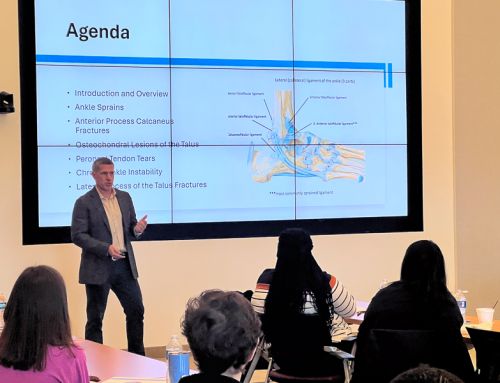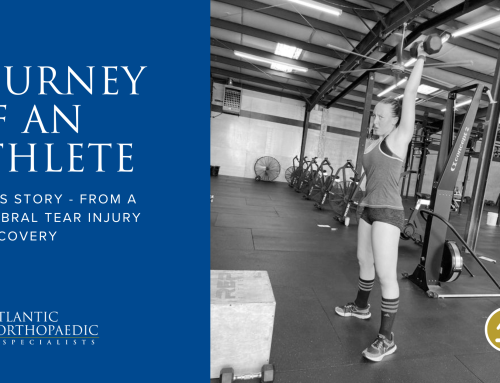Perseverance Pays off at Atlantic Orthopaedic Specialists
Perseverance Pays off when patient met orthopaedic surgeon, Michael A. Campbell, MD
A parachuting accident ended a military man’s career and nearly his way of life.
Anthony T. Adams, II Adams was a US Army surgical technician, on active duty when he suffered a ‘hard landing’ during parachute training exercises. The incident left his foot shattered. Army physicians tried twice, but were unable to surgically repair his foot. Their lack of success led to Adams’s medical discharge from the Army and the work he loved.
After his discharge, Adams sought the help of a surgeon who tried twice and failed to repair TJ’s foot and relieve his pain. When TJ asked that surgeon what the next step would be, he was told that “below the knee amputation,” (BKA) was the only answer. When he sought a second opinion, he was again told that amputation was the solution.
“I took pride in serving my country and helping so many people every day,” Adams said. “The Army was my way of life.” On active duty Adams was a surgical technician, “SP68,” assisting with surgeries both on and off the battlefield.
After his Army discharge, TJ returned to the operating room as a surgical assistant at DePaul Hospital in Norfolk, VA. He had been working there three years, side by side with orthopaedic foot and ankle surgeon Michael A. Campbell, MD. One day TJ mentioned to Dr. Campbell his failed surgeries, pain and the recommendations he’d received for a below the knee amputation. Dr. Campbell offered to “take a look.”
Dr. Campbell began work to save TJ’s leg and end his pain. It took months of planning, phone calls and detailed discussion with medical device manufacturers, but, Dr. Campbell had good news for TJ when he said, “I am confident we can save your foot.”
The surgery took longer than expected – nearly 4 hours – and tested the limits of Dr. Campbell’s ingenuity, experience and skill. First he removed old hardware, then cleaned out scar tissue and bone spurs, and lengthened TJ’s Achilles tendon.
Using a custom-made 4-web cage designed specifically for the procedure, Dr. Campbell successfully reconstructed TJ’s foot. “This is what it’s all about,” Campbell said. “It is very rewarding to help patients get past an injury and back to the activities they love.”
After four months in a cast, physical therapy and several follow-up appointments, TJ began assisting in surgery again. He is now working with training at an Army special operations academy.
“I can live a normal life now,” TJ said. “I can stand for hours assisting in surgery and play with my kids.” He added that he also enjoys running, fishing and exercising again. “I hope that other soldiers in similar situations to mine will be able to find the care they need and a surgeon like Dr. Campbell.”







